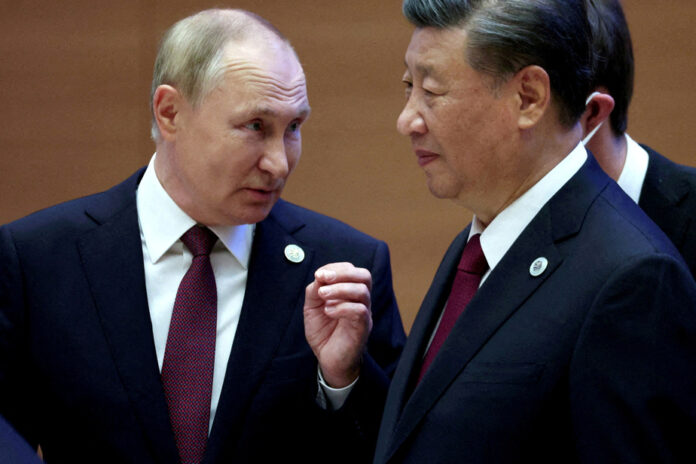(Beijing) Chinese President Xi Jinping begins a state visit to Russia on Monday, a “peace trip” according to Beijing that seeks to mediate in Vladimir Putin’s war in Ukraine.
The three-day trip to neighboring Russia, an important diplomatic and economic partner of China, is Xi’s first in nearly four years.
It comes just over a year after the Russian-initiated conflict in Ukraine that isolated Moscow on the international stage.
According to the Wall Street Journal, Xi Jinping, in the name of the neutrality displayed by his country, could meet with his Ukrainian counterpart Volodymyr Zelensky once back in China.
In a column for a Chinese newspaper published by the Kremlin on Sunday, Vladimir Putin hails “China’s willingness to play a constructive role in resolving the crisis” in Ukraine.
Xi Jinping and his Russian counterpart will have an “informal” first tete-a-tete on Monday before a dinner, then talks on Tuesday, Kremlin diplomatic adviser Yuri Ushakov was quoted by Russian news agencies as saying.
The two leaders will notably sign “a joint statement […] on deepening relations of comprehensive partnership and strategic relationship entering a new era” as well as a document on bilateral economic cooperation by 2030, a- he declared.
In his rostrum, the Russian president believes that “Russian-Chinese relations have reached the highest point in their history”. “There are no limits or forbidden subjects,” he insists.
Having facilitated the recent diplomatic reconciliation between Saudi Arabia and Iran, China is trying to position itself as a peacemaker.
Many analysts, however, doubt Xi Jinping’s ability to bring about such a rapprochement on the Ukrainian issue, given the ties that unite Moscow and Beijing – and his relative lack of influence on the Kremlin.
Beijing, however, calls for respect for the territorial integrity of states – including Ukraine. And Chinese Foreign Minister Qin Gang again last week urged Ukrainians and Russians to engage in peace talks.
A position deemed too lukewarm by the West, which considers that China tacitly supports Russian aggression and that Beijing’s great calls for peace have no immediate concrete solutions.
The United States has already indicated that it will not support a new Chinese call for a ceasefire during Xi Jinping’s visit to Russia, considering that this would amount to consolidating Russian control over the conquered territories in Ukraine.
The Chinese Foreign Ministry has presented the Chinese president’s trip as a “peace visit” which, according to Beijing, will promote “genuine multilateralism” and “improve global governance”.
Russia has been further diplomatically isolated since the International Criminal Court (ICC) announced on Friday that it had issued an arrest warrant for Vladimir Putin, charged with a war crime for the “unlawful deportation” of Ukrainian children.
Xi Jinping, who has just started a third term as president, something unheard of in China, regularly calls Vladimir Putin his “old friend”. In his column, the latter also speaks of Mr. Xi as a “good old friend” with whom he says he has the “warmest relations”.
United by a “limitless” partnership, celebrated last year three weeks before the start of the intervention in Ukraine, Beijing and Moscow have come closer in recent years, in particular to form a common front against the West.
However, weighing in on the war in Ukraine will be much more difficult for Xi Jinping than in the Iranian-Saudi diplomatic quarrel, notes Abanti Bhattacharya, a specialist in East Asia at the University of Delhi (India).
China had the advantage of being on good terms with Iran and Saudi Arabia, but despite its friendship with Russia, it “does not have close ties with Ukraine (and maintains) strong rhetoric anti-NATO,” she told AFP.


















